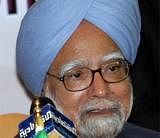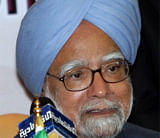

Addressing the Majlis-al-Shura or the Saudi Consultative Council here, he said India seeks a cooperative relationship with Pakistan for permanent peace as both countries are bound together by a shared future.
"We seek cooperative relations with Pakistan. Our objective is a permanent peace because we recognise that we are bound together by a shared future. If there is cooperation between India and Pakistan, vast opportunities will open up for trade, travel and development that will create prosperity in both countries and in South Asia as a whole," Singh said.
But to realise this vision, the Prime Minister asserted, Pakistan must "act decisively against terrorism". "If Pakistan cooperates with India, there is no problem that we cannot solve and we can walk the extra mile to open a new chapter in relations between our two countries," Singh, who is on a three-day visit to the oil-rich kingdom, said.
Noting that both India and Saudi Arabia are threatened by extremism and violence, the Prime Minister said, "History teaches us that the scourge of terrorism must be confronted with determination and united effort. "Nowhere is this challenge greater than in Afghanistan," Singh said.
"The people of Afghanistan have suffered for too long. They deserve an atmosphere of peace and the opportunity to pursue a life of dignity and hope," the Prime Minister said. He said the pursuit of terror in the name of religion or any other cause or grievance cannot be acceptable to civilised societies. "It has no sanction in any religion."
Singh asked the international community to support all sections of Afghan society who wish to work towards the emergence of Afghanistan as a modern, stable and sovereign nation. "No sanctuary should be given to those who promote terror, violence or instability in the country."
He said India wishes to live in peace and friendship with its neighbours and that he believed that all countries of South Asia should work to realise a common vision of peace and inclusive development for the region.
Addressing the members of the legislative body that advises the Saudi King, Singh said Islam is an integral part of India's nationhood and ethos and of the rich tapestry of its culture. "India has made significant contributions to all aspects of Islamic civilisation. Centres of Islamic learning in India have made a seminal contribution to Islamic and Arab studies," he said.
"Our 160 million Muslims are contributing to our nation building efforts and have excelled in all walks of life. We are proud of our composite culture...," he said. Returning to the issue of bilateral ties, he said India considers Saudi Arabia as a "pillar of stability" in the Gulf region and expressed confidence that the two countries could forge a "new partnership".
Describing west Asia as a vital part of India's extended neighbourhood, Singh said, "we have a high stake in the peace and stability of the region" and "neither the countries of the region nor the world could afford fresh turmoil."
He reaffirmed India's support for the struggle of Palestinian people and its backing for the Arab Peace Initiative to ensure peace and stability in the region. Referring to his meeting with King Abdullah and other Saudi leaders yesterday, Singh said these talks have led to reaffirmation of the close ties and common interests of the two countries.
"We have agreed to impart a strategic character to our relations, and have put in place a roadmap for bilateral economic, political and security-related cooperation that will constitute the core of our relationship in the coming years."
Singh said the kingdom is home to the largest Indian community abroad numbering 1.8 million and that Indian workers and professionals have participated in the "extraordinary development of this region".
He also expressed gratitude to Saudi Arabia for the warm welcome it has extended to the community as well as pilgrims from India who come here every year to perform Haj and Umrah. "As many as 165,000 Indian pilgrims perform Haj annually...the second largest group from any single country," the Prime Minister noted.
He sought increased exchanges between parliamentarians, scholars, scientists and students of the two countries and observed that there is scope for considerable expansion of interactions in political, defence and security spheres. Singh also said India and Saudi Arabia should work together to promote dialogue and peaceful co-existence among nations, religions and societies.
"We should work together as partners in shaping the global discourse on issues such as energy security, food security, climate change and terrorism. We should cooperate to deal with regional challenges such as maritime security, piracy, narcotics, human trafficking and other non-traditional threats to security," he said. "Together, India and Saudi Arabia can become a potent moral force for a better world and for a more secure future for our children," the Prime Minister said.
Speaking about India's growth Manmohan said he was confident that India's GDP will grow at 9 to 10 per cent annually in next 25 years. He sought Saudi investment in sectors ranging from infrastructure to hospitality as the country aspires to be one of the largest economies of the world.
"In the next 25 years, we aspire growth rates of between 9 to 10 per cent annually. This will enable us to lift millions of people out of poverty and to transform India into one of the largest economies of the world. India looks to the future with confidence and hope," Singh said.
He said despite the global economic slowdown, India hopes to achieve a growth rate of about 7.5 per cent in the current financial year. "Over the last five years, our economy has grown at an average annual rate of 9 per cent."
He said Indian industry is also ready to take advantage of the many opportunities that are opening up in the IT, banking, telecommunication, pharmaceutical and hydrocarbon sectors in Saudi Arabia.
Indian investments into the kingdom stand at more than USD two billion, covering over 500 joint ventures. Singh pointed out that the kingdom is one of India's major trading partners and the bilateral trade have registered unprecedented growth in recent years, standing at over USD 25 billion in 2008-09.
"We are looking at ways of means of expanding our traditionally strong collaboration in the energy sector." Singh, who is on a three-day visit to the oil-rich kingdom, also did some hard selling while addressing the influential Saudi Chambers of Commerce and Industry yesterday.
He had said the "conditions are ripe" for moving beyond a traditional buyer-seller relationship to a comprehensive energy partnership. Energy cooperation between the two countries has witnessed a massive increase since King Abdullah's Delhi visit in 2006, with Saudi exports jumping from USD 500 million that year to USD 23 billion in 2008, surpassing Iran as the largest supplier of crude oil to India.
Saudi Arabia had yesterday said it will double the supply of crude oil to India to around 40 million metric tonnes (MMT) per annum. In the Riyadh declaration issued after the meeting between Singh and the Saudi King last night, the two sides had emphasised the importance of developing a broad-based economic partnership and stressed on augmenting the flow of investments into each other's countries.
In this regard, the two leaders invited the private sector in the two countries and the Saudi-India Business Council to increase their efforts to take advantage of the investment opportunities.
The two leaders further emphasised "the importance of strengthening the strategic energy partnership based on complimentarity and interdependence, as outlined in the Delhi Declaration (of 2006), including meeting India's increasing requirement of crude oil supplies, and identifying and implementing specific projects for cooperation including in the areas of new and renewable energy."
India invited Saudi Arabia to participate in crude storage facilities in India. The two leaders directed the Joint Working Group on Energy to continue adopting all appropriate means to achieve the same, the Riyadh Declaration said.